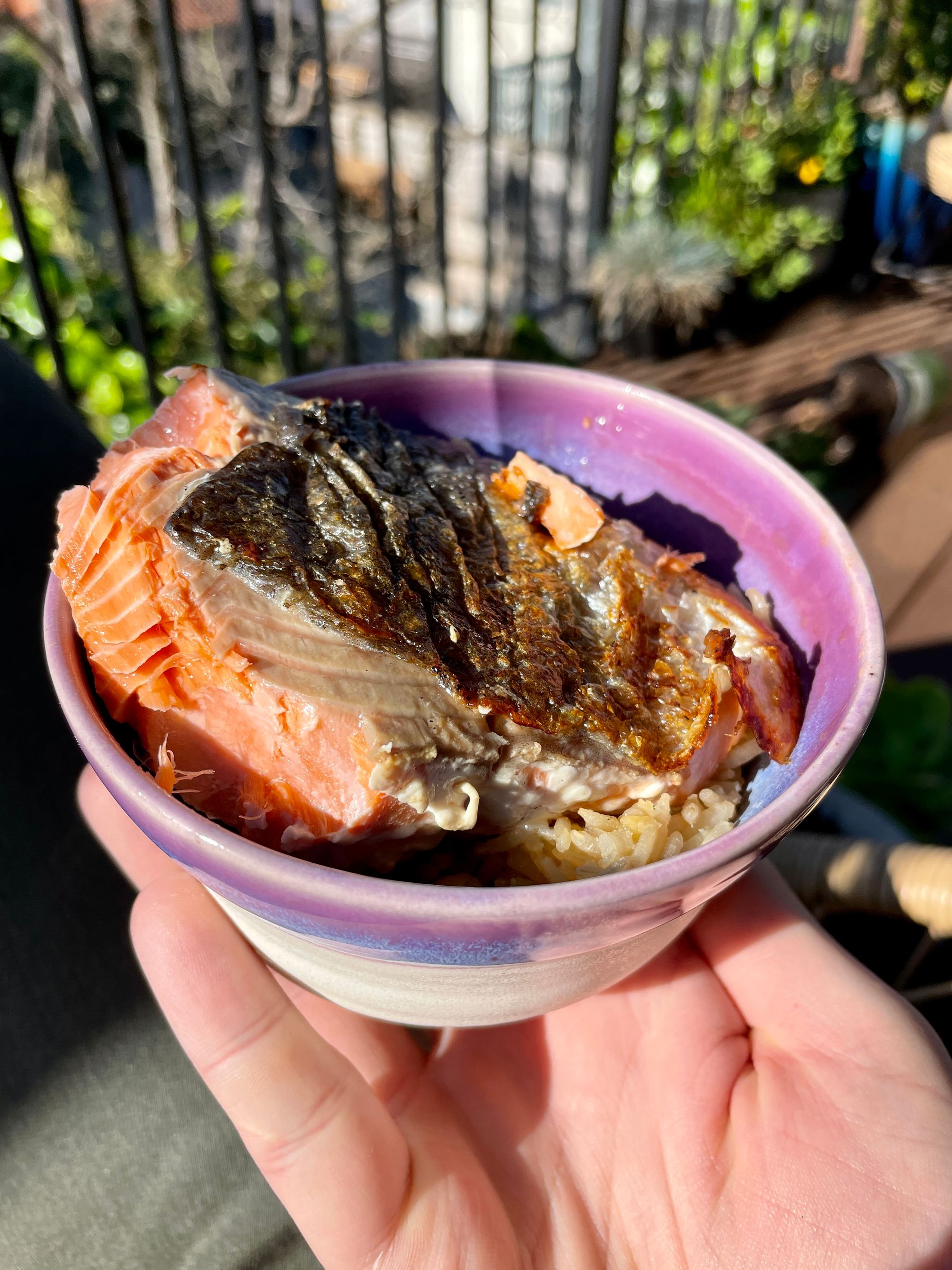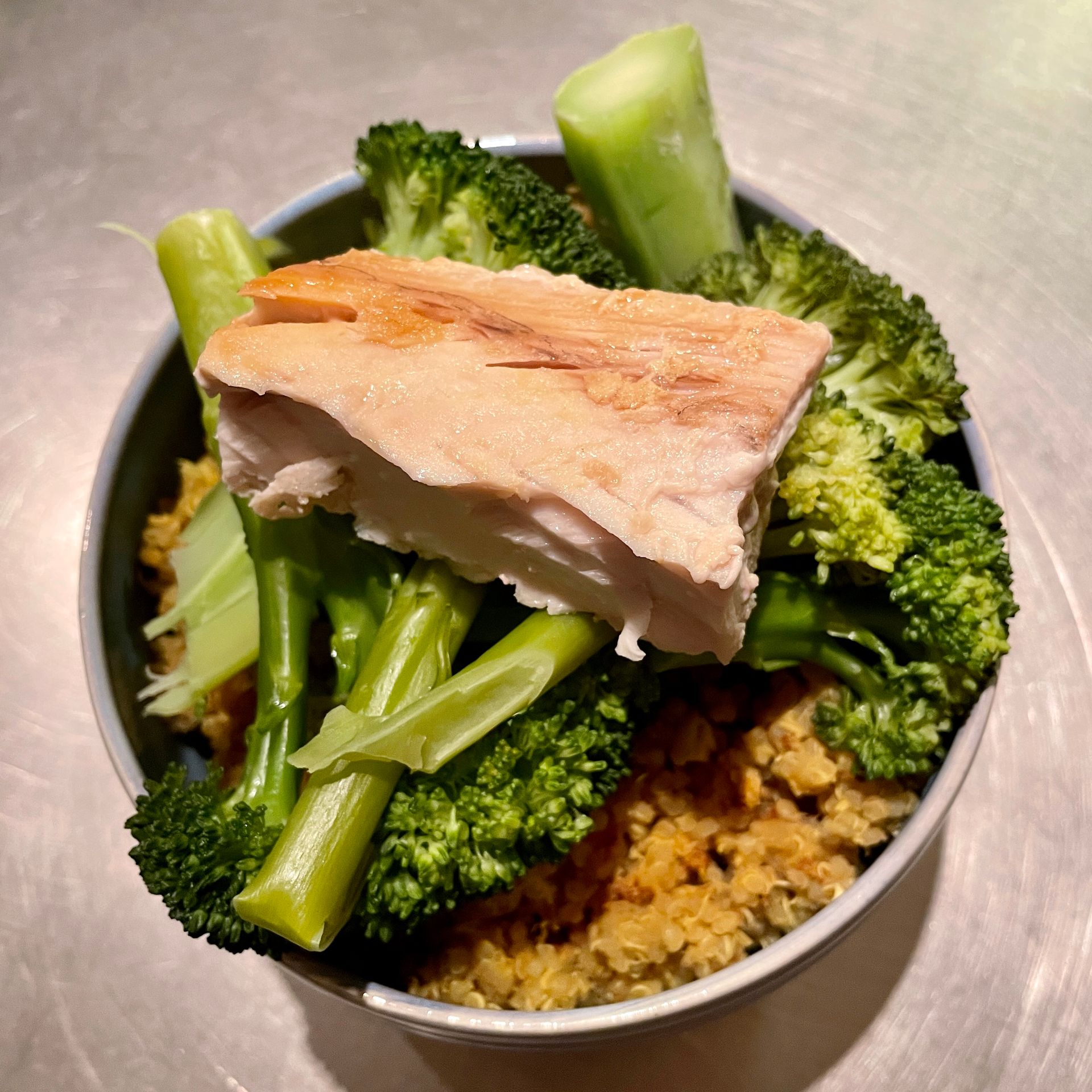As I mentioned in a previous post, I have a goal for significant weight loss this year and rethinking my diet is a significant part of that plan. It's not that my diet has been bad the last few months or years, just that weight loss journeys benefit from a good start and I know a well-planned diet will help me out significantly.
My goal is to eat roughly the same thing basically every day (caveats all covered below). This does not mean that every meal is the same, only that my daily total consumption should look basically the same every single day. I know I can't do planned meals, but I can make a pot or two of food and scrounge responsibly for the rest of the day. And, as I'll cover, I don't actually care about habit building or forcing a schedule on myself.
This post will cover the reasoning I have behind my dietary choices and why I think you should consider this format when deciding what you want to eat.
Flexibility is Key
As much as I'd love to eat spinach, chicken, and sweet potatoes every day like a well-behaved bodybuilder, I can't do that. I'd quickly go insane and give in to some cravings. I similarly know that I can't deal with pre-planned meals. Every meal should include a little bit of fun. While spices aren't technically 0 calories, they're close enough and I'll happily switch up the seasoning to keep food new and interesting.
I also can't keep myself to eating exactly the same thing, so I'm divided things into food groups. Broccoli and cauliflower are about equal in my book. Salmon and tilapia are two sides of the same coin. Brown rice is the same as white rice is the same as quinoa for my purposes. My foods are designed to fill specific roles in my diet, and as long as a food fits one of those roles I'll happily eat it.
And maybe most importantly, I'll only be forcing this on myself 6 days a week. Friends happen. Birthdays come and go. Weekend trips take longer than you thought they would. So I'll give myself one day a week to eat a different diet (but still hopefully about the right number of calories). I'll have to plan out my weeks to make sure I have that flexible day when it counts, but this will be make things much easier on me.
Know Your Priorities
As far as I'm aware, there are pretty well defined tiers to the importance of various parts of your diet:
- Caloric intake. If the amount energy you're taking in doesn't match what your body needs to lose/maintain/gain weight, it won't do what you want it to.
- Macronutrient distribution. Ultra-low carbohydrate/protein/fat diets are all very dangerous. While the actual distribution doesn't matter too much, you need at least 10% of your caloric intake to come from each of the 3 major macronutrients to prevent serious side effects.
- Micronutrient distribution. Your body is exceptionally good at making up for missing vitamins and minerals. But if you want to push yourself to be the best, you should make sure you're getting at least your daily recommended dose of the major vitamins and minerals.
- Other. Creatine is great, for example, but not essential and certainly less valuable than all of the above. There are all sorts of other things people ingest to get better at various things, but these will only really matter once you have the rest of your nutrition in order.
Unfortunately I don't have great sources for these tiers. They're beliefs I hold pretty strongly from years of learning about sports performance, and unfortunately most of the information out there is extremely biased. This bias comes in unexpected forms, not just the one that tries to sell you supplements.
Your cultural heritage and upbringing will have a huge influence over what you consider important in a diet. Some people remember the food pyramid and believe in it, others reject it because they were taught to distrust everything the government says. Some people remember their parents on Atkins diet and are now attracted to the carnivore diet. Others demand that only fruits and vegetables be called "healthy". You need to know your own biases before going into this, or you risk not finding a sustainable diet for your mental wellbeing.
Building the Diet
You need to start with the most important part in food selection: caloric intake. And this necessitates you open up a tool like MyFitnessPal or something similar. Tools in hand, it's time to start.
Use your favorites
If you have a favorite food that you need every day, include it now. You may have to adjust the serving size to make it fit, but access to comfort food is an easy way to make the transition to a new diet for pleasant. Thankfully, I don't have any foods that I miss terribly and I'm happy to wait for my cheat day to order in some curry or pizza or whatever I have a craving for.
Calories
Now for the golden rule, and the only one rule that matters when you're trying to manage your weight:
Your weight change will be proportional to the difference between the number of calories you consume and the number of calories you burn.
It's that easy. Want to lose weight? Eat fewer calories. Determining the correct number of calories is something you'll have to play with on your own, but a general rule to follow is that 3500 calories equals 1 pound of body weight. If you could somehow eat the same as now but burn an extra 500 calories a day, you should average 1 pound of weight loss per week.
The problem is 500 calories is a lot. You almost certainly don't burn more than 2000 calories per day; don't believe the back of the cereal box. Elite athletes often don't burn more than 4000 a day even when working out for 3 or more hours per day. Do you really think your lounging burns more than 1500 calories a day?
Write down the number of calories you'd like to consume per day. I wanted to start at around 2000 calories per day.
Macronutrients
Here's where you get to start making real decisions. Do you want to try keto? A high-protein diet? High carb? Make some notes right now about what your target ratios are going to look like.
There's some mild evidence that protein digestion is harder for the body than the other macronutrients and might have a weight-burning effect. There's also evidence that people on ketogenic diets feel more satiated and therefor want to eat less often than those eating carbs. And, lastly, I've seen some evidence that carbs with loads of fiber are extremely effective at curbing appetite.
There are no right answers here, but remember that you want to target at least 10% of your caloric intake from each of the 3 macronutrients.
I personally like a high protein, high fat diet. In practice, this means that about 40% of my calories come from protein and 30% from carbs and fats. It's very difficult to cut carbs below about 30% without committing to a ketogenic lifestyle, and there's quite a bit of evidence that low carb diets mess with most athletic endeavors.
Micronutrients
Here's where you can start playing with small things. I use NutritionValue.org to look up foods and make sure what I'm eating makes sense, but you should use your favorite recipe builder to build out your day of eating.
There are plenty of resources to find out how to get access to different micronutrients. Some of them are more important than others, but generally you should strive to get more than 80% of the recommended value of each per day. If you're really struggling to fill in the numbers, go out and grab some supplements. They're an easy way to add some nutrition to your diet.

Other
I'm going to be taking creatine because of my performance goals, and I'll be drinking coffee because I love coffee. Coffee also happens to have some caffeine in it, which is a reasonably strong appetite suppressant. Again, this section is gravy on top of an already sound nutrition plan. Don't come here looking for solutions: your problems were solved in the previous sections, this is just a bonus.
Choose Your Foods
For me, the first few things were obvious:
- Broccoli: one of the most nutritionally-dense plants on the planet and incredibly low calorie. I also love the flavor. I can eat 1 big head a day, which works out to about 300 grams. In the same group: cauliflower, sweet potato.
- Kale: similar to broccoli. Dark leafy greens should be a staple of your diet regardless of what you're trying to accomplish because they're so good for you. I don't like it as much as broccoli, but a couple leaves (100 grams or so) is all I should need. In the same group: chard, collard greens.
- Salmon: my favorite fish. Great source of protein, and depending on what you need, you can scale the fat down. Lots of omega-3 and 6 fatty acids, which are supposed to be good for you (but definitely fit in the "Other" tier of priority). Fish is also the protein that I like the most when cooked on its own, and I can easily put down 2 fillets (700 grams) every day. In the same group: tofu, basically any other fish.
- Rice: well rounded food. This is the lead member of my grain group, which can also include basically anything you see on the shelf near rice. I can't commit to portions yet because rice is a great way to fill out the calories in a day, but I know it'll be here. In the same group: quinoa, buckwheat, spelt, amaranth, etc.
- Lentils: or beans. While very calorically dense, I love lentils and beans. I'll have to limit my consumption, but combined with rice this is a great way to fill out my caloric needs. In the same group: most beans.
At this point I've accounted for about 1100 calories. I need some snacks to make sure I have something to pick at when I'm inevitably hungry. Snacks are one of the most important things for me to keep under control, and also one of the things that keeps my cravings in check if they work for me.
- Almonds: extremely high in vitamin E, but come at the cost of being extremely calorically dense. I need to limit this to 25 grams to keep the calories from running away from me, but that works out to about 2 handfuls and should satisfy me.
- Yogurt: decent source of B vitamins, calcium, and protein (not that I need more). I really like plain yogurt, and 200 grams seems about right for a snack. Currently I don't discriminate between Greek and regular yogurt.
- Eggs: good source of some B vitamins and always a good low-carb snack. There's not much to say about boiled eggs. I'll have to max out at 2 per day (about 100 grams), but these are super easy to make in batches so it should always be an option for me.
- Bell pepper: crunchy, sweet, and loaded with vitamin C. They also stay good in the fridge for a shockingly long time.
This seems like a pretty good set of snacks, and it puts me at about 1500 calories. With my last 500 calories, I'll finally start filling in my rice and lentil values. I'll start with about half a cup of rice (100 grams) and a quarter cup of lentils (50 grams), both measured dry before cooking. And sure enough! This brings me right up to around 2000 calories!
Double check
Going through my foods, I'm still potentially low in certain areas. Calcium, iron, sodium, and vitamin E all look pretty low. Should I be worried?
Probably not! Tofu is incredibly rich in iron and calcium and I'll be eating it instead of fish quite often. I'll easily add enough salt and other seasonings to my food to make up for the low sodium numbers. And other sources consistently tell me that brown rice has a good amount of vitamin E, but the tool I'm using says it contains 0.
So, double check your work. Make sure the tool you're using lines up with what you read elsewhere. But it should help you get started in constructing a reasonable and maintainable diet for yourself.

